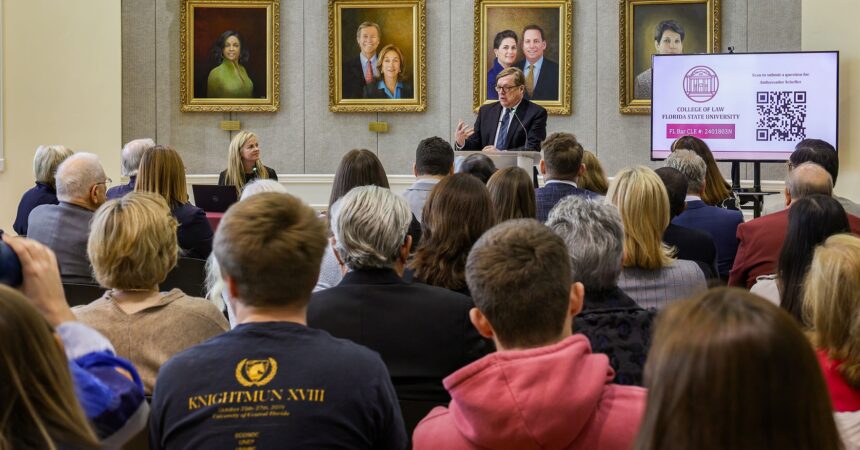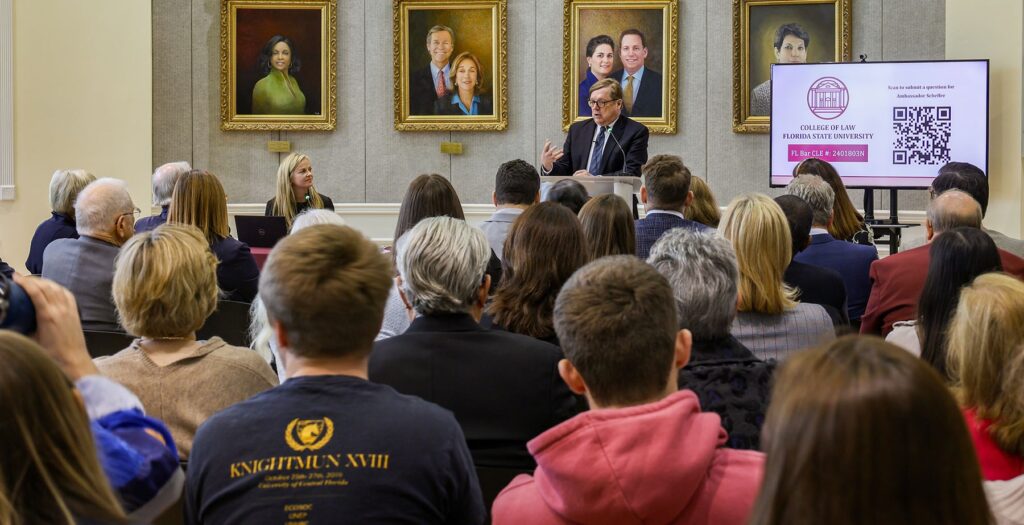
Former ambassador speaks to FSU students about future of international criminal justice

Photo submitted
Special to the Outlook
The Florida State University College of Law furthered its mission to advance human rights around the world with a lecture by the first U.S. ambassador-at-large for war crimes issues.
Ambassador David Scheffer, a titan in the field of human rights, spoke to a standing-room-only audience during the second annual D’Alemberte & Palmer Lecture in International Human Rights last Thursday in the College of Law Rotunda.
The endowed lecture, made possible by a gift from former FSU First Lady Patsy Palmer, was created to attract giants in the field of international human rights and inspire students. Palmer’s late husband, Talbot “Sandy” D’Alemberte, served as FSU’s president from 1994-2003 and established the university’s Center for the Advancement of Human Rights.
“This lecture, on a personal note for me, reflects the manner in which Sandy D’Alemberte led this university as president and as a founder of the Center for the Advancement of Human Rights,” said Jim Clark, provost and executive vice president for Academic Affairs. “Sandy was a passionate advocate who got things done in a passionate and pragmatic way, but loved the world of ideas and was a true citizen of the republic of letters.”
Scheffer, who was instrumental in the creation of five international or hybrid criminal tribunals, discussed the future of international criminal justice in the context of the Ukraine-Russia and the Israel-Hamas wars, as well as several other global conflicts and violations of human rights.
He said that while the “thirst for justice” is being met in many conflict areas across the globe that “there are gaps to fill, and many challenges to face in the years ahead. The world remains exceptionally violent, and adherence remains problematic under what I describe as atrocity law — where the law of war, international humanitarian law, international human rights law and international criminal law intersect.”
Scheffer currently serves as professor of practice in the School of Politics and Global Studies at Arizona State University and authored the award-winning book, “All the Missing Souls: A Personal History of the War Crimes Tribunals,” which recounts his tribunal-building efforts during the 1990s.
“Atrocity crimes are the scourge of our times, and the United States should be proudly and confidently at the forefront, with our allies and friends, bringing perpetrators of such heinous acts to justice and ensuring that our countries are not safe havens for such individuals,” he said.
After the lecture, Scheffer answered audience questions and offered students advice on how to pursue a career in international law. He urged students to learn the fundamentals of the law, seek out pro bono projects and encouraged them to get experience as a public defender.
Two students were honored after the lecture with the Ellis Medal and the D’Alemberte-Ellis Fellowship.
Robin Rodriguez, the inaugural recipient of the D’Alemberte-Ellis Fellowship last year, won the Ellis Medal, honoring a graduating third-year student who has done the most to further their education in international law and embrace experiences in international law specifically in international human rights.
The D’Alemberte-Ellis Fellowship is a competitive fellowship that awards a financial stipend to a student who undertakes international human rights law internships in developing countries. This year’s winner is Nicholas Lower.







